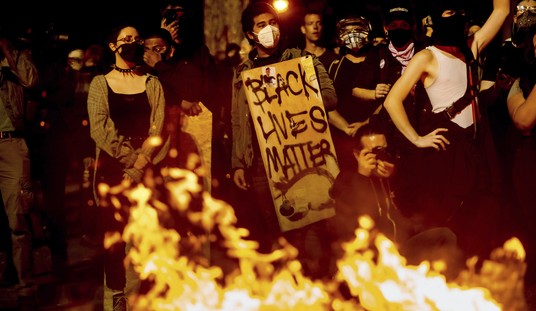Fusion, a Website that’s an, err fusion between Univision and ABC/Disney is shocked that Ferguson real estate prices are “Down nearly 50 percent since Michael Brown’s death.” There’s more than a hint of bias in that subhead, as the cause wasn’t Brown’s death after he slugged a convenience store clerk and attempted to steal a police officer’s gun, but the riots and looting that followed — which were another kind of media fusion, ginned up by via the minicams of CNN and fueled further by NBC anchorman Al Sharpton’s corrosive presence:
[John] Zisser, 55, has owned and operated Zisser’s Tires in this city since 1987. He says the still-visible damage from the November protests that followed a grand jury’s decision not to indict Ferguson officer Darren Wilson for the shooting death of teenager Michael Brown is hurting property owners. His store’s insurance is in the process of being cancelled after it was twice vandalized during the unrest, he says.
“If I sold this place today, I could probably get $300,000 for it, if anyone is crazy enough to buy. Last year, the county said this lot was worth almost a million,” he says. “The value here is all going down. There’s about nine burnt-out buildings this way,” he says, pointing. “And about four more behind me.”
Zisser is one of many Ferguson residents feeling a financial toll from the months of protests, media attention, and now another high-profile shooting. They’re worried not just about their own situations, but about the city coffers, too. The future of Ferguson, they say, is anyone’s guess.
“How much money are we going to lose?” Zisser asks. “How much money is the city and the county going to lose in taxes because of this? And how much is the school district going to lose here? They’re the biggest losers.”
Not at all “unexpectedly,” of course, as Fred Siegel warned in August of last year at City Journal:
Riots bring but one certainty—enormous economic and social costs. Businesses flee, taking jobs and tax revenues with them. Home values decline for all races, but particularly for blacks. Insurance costs rise and civic morale collapses. The black and white middle classes move out. Despite its busy port and enormous geographic assets, Newark, New Jersey has never fully recovered from its 1967 riot. This year, Newark elected as its mayor Ras Baraka, the son and political heir of Amiri Baraka—the intellectual inspiration for the 1967 unrest.
The story is similar in Detroit, which lost half its residents between 1967 and 2000. Civic authority was never restored after the late 1960s riots, which never really ended; they just continued in slow motion. “It got decided a long time ago in Detroit,” explained Adolph Mongo, advisor to the jailed former “hip-hop mayor,” Kwame Kilpatrick, that “the city belongs to the black man. The white man was a convenient target until there were no white men left in Detroit.” The upshot, explained Sam Riddle, an advisor to current congressman John Conyers, first elected in 1965, is that “the only difference between Detroit and the Third World in terms of corruption is that Detroit don’t have no goats in the streets.”
“No doubt little will be learned from Ferguson. No doubt there will be more Fergusons,” Siegel concluded. We’ve seen Ferguson’ possible future. And it’s not at all pretty:
[jwplayer player=”1″ mediaid=”79429″]










Join the conversation as a VIP Member